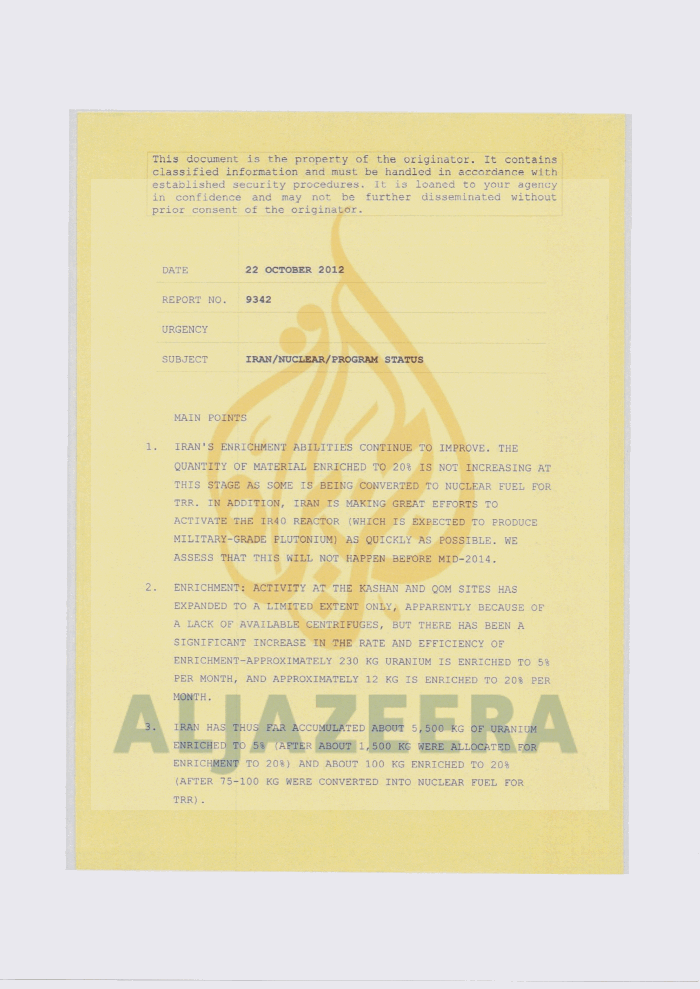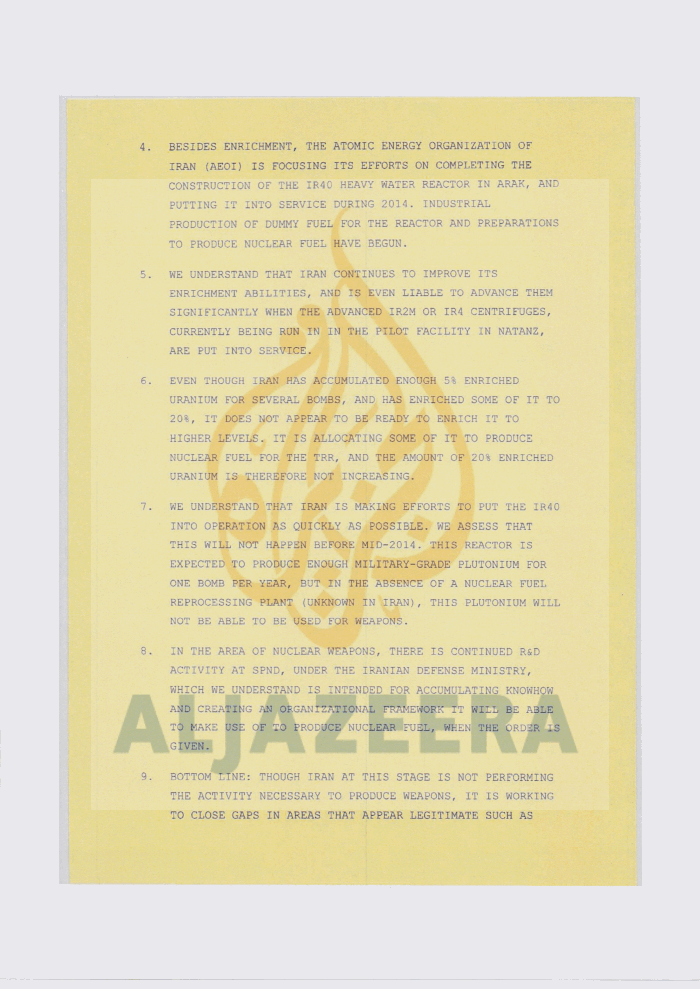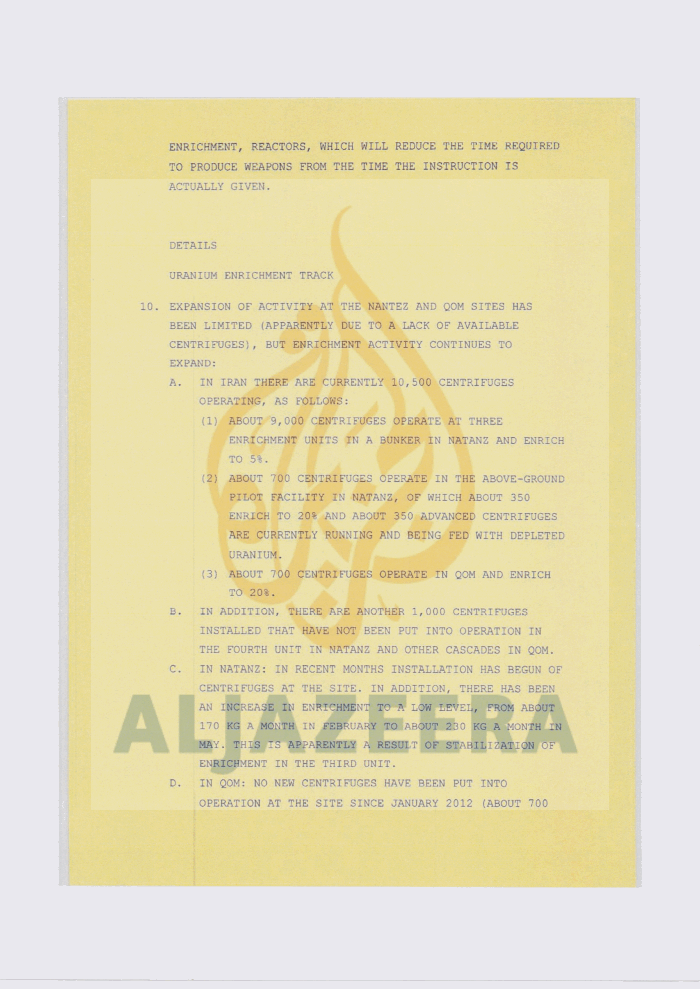Spy Cables reveal Mossad concluded that Iran was not producing nuclear weapons, after PM sounded alarm at UN in 2012.
Will Jordan, Rahul Radhakrishnan
Less than a month after Prime Minister Benjamin Netanyahu's 2012 warning to the UN General Assembly that Iran was 70 percent of the way to completing its "plans to build a nuclear weapon", Israel's intelligence service believed that Iran was "not performing the activity necessary to produce weapons".
A secret cable obtained by Al Jazeera's Investigative Unit reveals that Mossad sent a top-secret cable to South Africa on October 22, 2012, that laid out a "bottom line" assessment of Iran's nuclear work.
It appears to contradict the picture painted by Netanyahu of Tehran racing towards acquisition of a nuclear bomb.
Writing that Iran had not begun the work needed to build any kind of nuclear weapon, the Mossad cable said the Islamic Republic's scientists are "working to close gaps in areas that appear legitimate such as enrichment reactors".
Such activities, however, "will reduce the time required to produce weapons from the time the instruction is actually given".
That view tracks with the 2012 US National Intelligence estimate, which found no evidence that Iran had thus far taken a decision to use its nuclear infrastructure to build a weapon, or that it had revived efforts to research warhead design that the US said had been shelved in 2003.
Netanyahu plans to address the US Congress on March 3 and warn against the nuclear compromise currently being negotiated between Tehran and world powers.
Media reports and public comments by senior current and former officials have frequently indicated dissent from within Israel's security services over Netanyahu's alarmist messaging on Iran.
However, the document leaked to Al Jazeera makes clear that the Mossad's formal assessment of Iran's nuclear capacity and intentions differs from the scenario outlined by the prime minister at the UN.
The cable was relayed to South Africa's State Security Agency (SSA) shortly after the September 2012 address in which Netanyahu had displayed a cartoonish diagram of a bomb with a fuse, marked with a 70 percent line and another "red line" at 90 percent.
The markers represented progress milestones in Iran's uranium enrichment work. He argued that medium-enriched uranium (which Iran had begun producing, saying it was needed to fuel a research reactor producing isotopes to fight cancer) took Iran 70 percent of the distance to enriching weapons-grade material.
The Israeli prime minister told the UN General Assembly that "by next spring, by most at next summer at current enrichment rates [Iran] will have finished the medium enrichment and move on to the final stage", in which he said they would enrich uranium to weapons grade.
'Not the right way'
Earlier in 2012, former Mossad chief Meir Dagan had hinted at a disagreement with Netanyahu. In an interview in March, he warned of overstating the danger of Iran's nuclear activities and of putting Israel on a path to war with Iran.
The spy chief said it would be a "stupid idea" to attack Iran before other options were considered. "An attack on Iran before you are exploring all other approaches is not the right way," Dagan had said.
His comments would likely have been informed by his former agency's analysis reflected in the document obtained by Al Jazeera.
It reveals that in October 2012, Israel's foreign intelligence service estimated that Iran had 100 kilogrammes of uranium enriched to a level of 20 percent.
Iran expanded that stockpile over the following year, but then agreed to neutralise or destroy that material under an agreement with the US, Britain, China, Russia, France and Germany - the so-called P5+1 group.
Reports of discord between Netanyahu and the Mossad over Iran surfaced again last month amid reports - later denied - that the Israeli intelligence service had warned Washington that new US sanctions would sabotage nuclear negotiations between Iran and world powers.
Iran and the P5+1 are currently pursuing a framework pact for a permanent deal by the end of March, and a full technical agreement by the end of June. Iran insists its nuclear work is entirely for peaceful purposes; the premise of the nuclear deal currently being negotiated is to strengthen verifiable safeguards against weaponisation of nuclear material.



Comments
Post a Comment